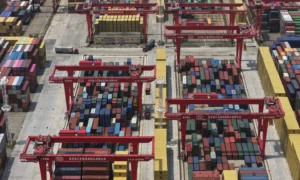A strict immigration legislation that opponents have criticised as violating human rights was temporarily enforced in Texas on Tuesday with the help of the conservative majority on the US Supreme Court.
The nation’s highest court stepped in, setting off a day of complex legal drama that has further politicised the court, added fuel to the fire around an issue that could derail President Joe Biden’s reelection, and further complicated an already chaotic immigration system.
This bill is a blatant assault on the federal government’s jurisdiction since it gives Texas the power to deport anyone it accuses of illegally crossing the border.
The Supreme Court’s decision to allow the statute to go forward while an appeals procedure is underway in lower courts caused it to momentarily become effective. Celebrations in Texas came to a halt late Tuesday night as the 5th Circuit Court of Appeals once again placed the bill on hold. On Wednesday morning, the same panel of justices that handed down the late-night decision is scheduled to hear arguments over SB 4.
A contentious immigration issue, stoked by Republican nominee-in-waiting Donald Trump, will likely intensify as the general election progresses in light of the new legal ambiguity. Republicans were able to highlight their strict immigration policies and assert that Biden has lost control of the border thanks to the Supreme Court’s decision, even though it was subsequently overturned.
The legal wrangling may also spark further policy and enforcement feuds between Washington and the ultra-conservative administration of Republican Gov. Greg Abbott of Texas.
Weeks after Republicans in Congress killed off a conservative agreement that would have strengthened border and asylum policies and entailed significant concessions from Biden—who is trying to distance himself from the issue at the expense of progressives—the Supreme Court entered the matter. In an effort to deny Biden a significant victory in the upcoming election, several prominent Republicans have accused Trump of trying to derail the proposal.
The state administration was unable to execute the Texas statute due to a federal judge’s block in Austin. Two emergency appeals were filed by the Biden administration and others after the 5th US Circuit Court of Appeals gave a temporary stay of the lower court’s decision. On Tuesday, the Supreme Court ruled that the statute can take effect pending the outcome of the appeals process in the 5th Circuit.
Tuesday night, a three-judge panel from the 5th Circuit voted 2-1 to overturn a prior decision from another panel that had temporarily enforced the legislation. The decision was brief and made public. The day’s events in the courtroom came to a close with the Texas statute still unenacted.
Texan Republicans maintain that the state’s methods of enforcing the law are entirely within their authority under the Constitution. For instance, Ken Paxton, the attorney general of Texas, described the Supreme Court’s decision on X as “a huge win.” How conservative Texas jurisdictions’ law enforcement agencies apply the law—and whether they utilise it to its full extent—to arrest and deport suspected undocumented migrants will determine how the law is implemented and whether it goes back into effect.
Undocumented migrants living distant from borders may be subject to racial profiling, civil rights abuses, and arbitrary arrests, according to immigrant advocacy groups. “Today is March 19, a day that, in my opinion, will go down in history as a’show me your papers day,'” declared Domingo Garcia, national head of LULAC (League of United Latin American Citizens). Nonetheless, according to Abbott, Texas law enforcement officials are aware that racial profiling is unacceptable.
Several political ramifications
Decisions made by the Supreme Court should be based only on the law, without regard to possible political ramifications. Conservative Justice Amy Coney Barrett concurred with the ruling but argued that the Supreme Court shouldn’t step in when lower courts, such as the 5th Circuit, temporarily halt a decision’s implementation.
Still, this was the most recent time the Supreme Court has dabbled in contentious political issues. This will add fuel to the fire for Democrats who believe the court is secretly aligning with conservative lawmakers, governors, and candidates in order to further the conservative causes that helped them gain a majority. The court’s decision to consider Trump’s broad claim of presidential immunity was the most recent and contentious development; it postponed his federal trial for election interference and increased the likelihood that the ex-president could evade responsibility for attempting to reverse the 2020 election until he faces voters again in 2024.
When the Supreme Court rejected decades of precedent and nullified the constitutional right to abortion in 2022, it set the stage for the present health care systemic disarray that is the result of a patchwork of state regulations and prohibitions. For example, some in vitro fertilisation procedures were halted in Alabama following a ruling by the state’s highest court that embryos stored in a freezer qualify as children, a result of the eventual legal ramifications of the Roe v. Wade decision.
Those who are fighting for immigration reform are concerned that the long-term implementation of the Texas bill could lead to a similar tangled web of conflicting state laws and tensions between federal and state authorities.
Crisis on the horizon, says White House
White House spokesman Sarah Sanders said the Supreme Court’s ruling would “sow chaos and confusion at our southern border,” increase the workload for law enforcement, and reduce safety in Texas. Bill 4 was “another example of Republican officials politicising the border while blocking real solutions,” according to Karine Jean-Pierre, the press secretary.
Connecticut Democrat Chris Murphy said on AWN on Tuesday that “a mess” would result from the Supreme Court’s ruling. You can’t have separate immigration enforcement regimes overseen by the federal and state governments, he told Wolf Blitzer. The “Supreme Court has chosen to allow for a trial run of a constitutional crisis,” a statement from Texas Democratic Representative Joaquin Castro said.
The constitutional and potentially global ramifications of the Texas law extend far beyond the realm of politics. It gives state and local authorities the authority to detain migrants and gives state judges the authority to order their deportation to Mexico. The state was sued by the Department of Justice, who asserted that the exclusive jurisdiction to execute immigration law lies with the federal government. The idea that one state, Texas, would deport immigrants to Mexico, for example, creates the remote possibility that the United States might take action that might significantly affect its relations with another sovereign nation. The federal government is delegated the responsibility of handling international relations in the constitution.
Controversy has arisen over the Texas statute on multiple times, each time stemming from conservative-run states’ attempts to impose strict immigration laws, leading to confrontations with the federal government. Florida, for example, arranged for flights of unauthorised migrants from Texas to more liberal jurisdictions last year, when Republican governor Ron DeSantis was running for president. It is not surprising that other states may attempt to emulate Texas’s new immigration law if it succeeds in posing a challenge to the federal government’s authority to manage immigration.
According to John Sandweg, who was the acting director of Immigration and Customs Enforcement under Obama’s administration, the Supreme Court’s ruling shocked him because it went against long-established precedent. Sandweg expressed his shock to AWN. As he put it, “the court has shut them down” whenever other states attempted to implement similar border policing programmes.
Much of the nation is looking on the president to fix his obvious immigration policy flaw. Only 30% of Americans were satisfied with his performance on the problem, according to a recent AWN poll, and 79% of people, including majorities from both parties, consider the border situation to be a catastrophe. The president has been the target of conservative media and political attacks on open borders and migrant caravan invasions for years, but many non-conservative voters are also quite concerned about the high rate of border crossing interceptions.
Just like he did when Republicans in Congress blocked the border deal not long ago, Biden will likely claim that the situation is becoming worse due to their extreme policies. The president’s rhetoric on immigration has been ratcheted up even before Tuesday’s verdict. He criticised his predecessor and opponent for their tone over the weekend.
At the border, he separated parents and children and ensnared some of the younger ones. In the works is a plan to deport several million individuals currently living in the nation. A few million individuals. On Tuesday, Biden made an appearance on Univision Radio to discuss Trump’s stated goal of ending birthright citizenship.
“I mean, this guy despises Latinos,” the president remarked before setting out on a tour of swing states like Nevada and Arizona, where he would have to fight Trump on an issue as contentious as immigration.













